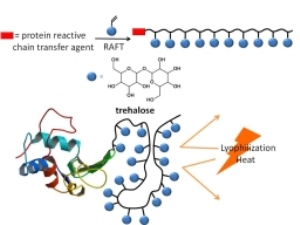Researchers from the California NanoSystems Institute (CNSI) at UCLA and the UCLA Department of Chemistry and Biochemistryhave developed a way to stabilize proteins using polymers.
 How polymer based on a natural sugar stabilizes proteins
How polymer based on a natural sugar stabilizes proteins
The polymers, synthesized by the team, comprise a polystyrene support and side chains made of trehalose, a disaccharide found in several animals and plants that can live for longer periods with little or no water. Trehalose is identified to stabilize proteins once water is removed. Hence, it is used as an additive in various protein drug formulations that have secured the Food and Drug Administration (FDA) approval to treat cancer and other disorders.
Heather Maynard, an associate professor of chemistry and biochemistry at UCLA and a member of the CNSI, stated that the researchers have synthesized their polymers using a controlled radical polymerization technique known as reversible addition-fragmentation chain transfer (RAFT) polymerization. They discovered that the polymers considerably stabilized the protein calledlysozymeto lyophilization or freeze-drying and heat better than the protein without additives. The team linked the polymer covalently tolysozymeto form a protein-polymer conjugate, which strengthened the protein better than the non-conjugated polymer. In addition, the study revealed that the polymers stabilized the protein considerably better than the polyethylene glycol and trehalose that are currently used.
Now, the Maynard research team is investigating the application of their polymer as a stabilizer in FDA–approved protein therapeutics. They are also exploring how the proteins are stabilized by using the polymers.